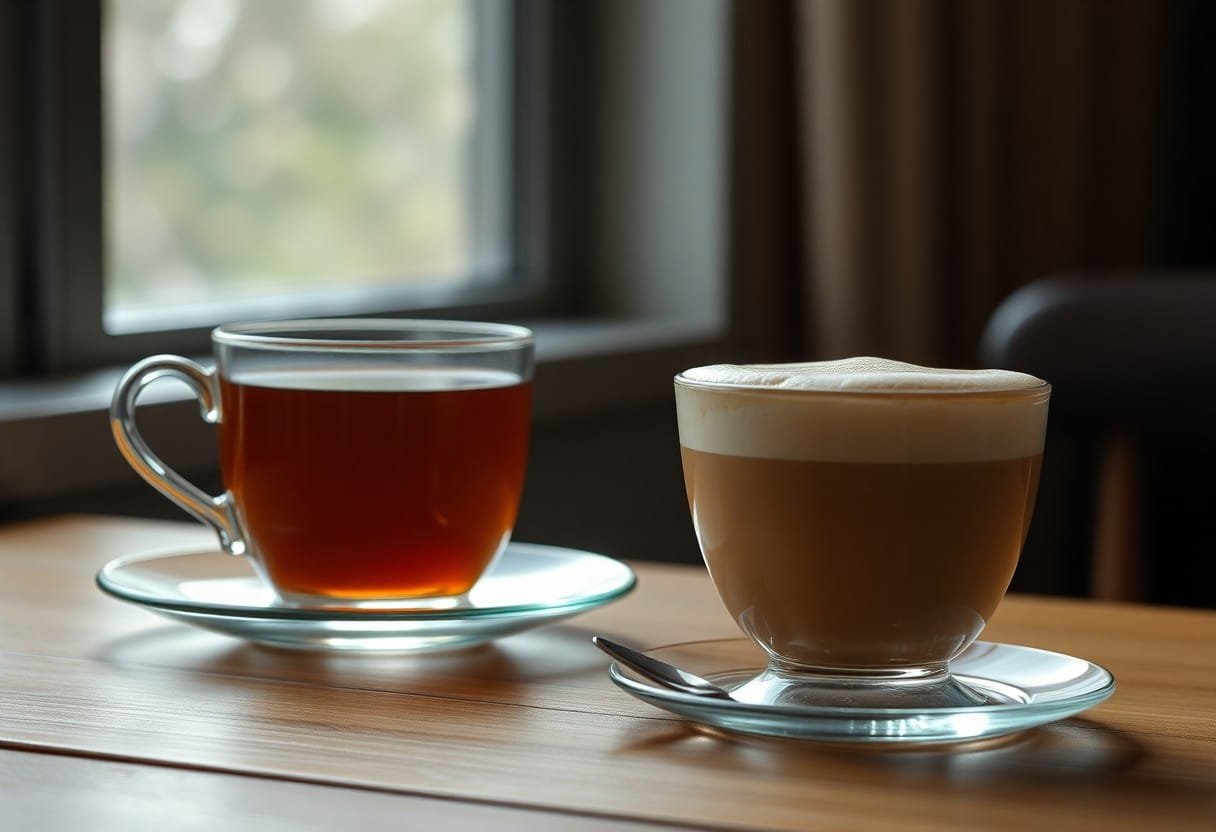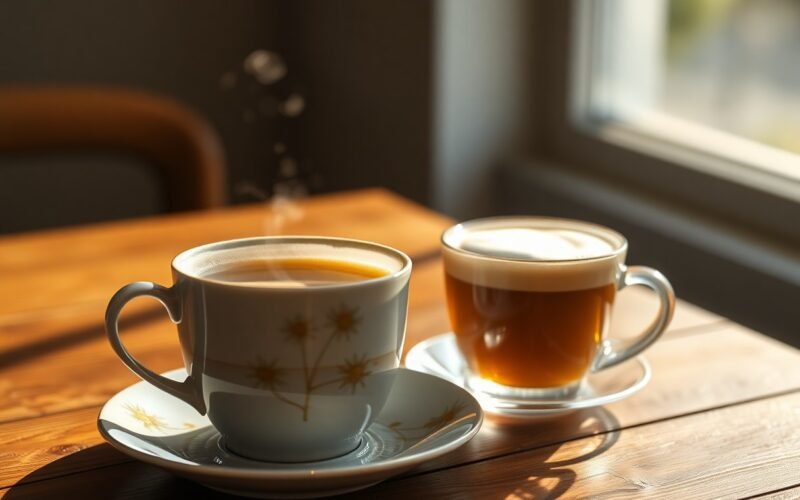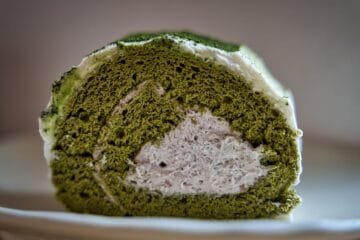You may find yourself pondering which beverage truly enhances your afternoon relaxation: chamomile tea or cappuccino? While chamomile is renowned for its calming properties and ability to promote sleep, cappuccino offers a delightful pick-me-up with its rich flavor and soothing warmth. In this article, we will explore how both choices affect your body and mind, helping you determine which drink best suits your need for relaxation in those quiet afternoon moments.
Key Takeaways:
- Chamomile tea is a naturally caffeine-free herbal option that is known for its calming properties, making it ideal for relaxation and reducing stress in the afternoon.
- Cappuccino, while also enjoyable, contains caffeine which can enhance alertness; this may not be conducive to relaxation for everyone, especially those sensitive to caffeine.
- The choice between chamomile tea and cappuccino ultimately depends on personal preference and how an individual responds to caffeine, as each can provide comfort in different ways.
The Calming Properties of Chamomile Tea
Chamomile tea offers a gentle way to unwind, thanks to its sedative effects that promote relaxation and alleviate anxiety. This herbal infusion is rich in antioxidants, particularly apigenin, which interacts with receptors in your brain, aiding in a sense of calm. Drinking a warm cup of chamomile can help ease physical tension and make afternoons feel more tranquil, inviting you to embrace a reflective state of mind.
Ancient Herbal Remedies: A Historical Perspective
Used for centuries as a natural remedy, chamomile dates back to ancient Egyptian culture where it was revered for its healing properties. This humble flower found its way into traditional medicine across cultures, from Greece to Ayurveda, effectively treating ailments including anxiety, insomnia, and digestive issues. Your afternoon ritual of sipping chamomile tea connects you to a long history of herbal wisdom, showcasing its enduring popularity as a soothing tonic.
Scientific Evidence: How Chamomile Affects the Nervous System
Scientific research supports chamomile’s status as a natural relaxant, with studies demonstrating its capacity to influence the nervous system. Trials involving participants who regularly consumed chamomile revealed significant reductions in symptoms related to anxiety and insomnia. The presence of apigenin plays a vital role in this process, binding to specific receptors in your brain that help regulate sleep patterns and mood stabilization.
Further evidence indicates that chamomile not only helps alleviate anxiety but also enhances sleep quality significantly. For instance, a study published in the American Journal of Clinical Nutrition showed that participants who consumed chamomile extract before bed experienced better sleep hygiene and reduced nighttime awakenings. Such findings underscore how chamomile tea can be a valuable addition to your relaxation routine, harnessing the power of nature to help you navigate the stresses of daily life.
The Creamy Comfort of Cappuccino
The rich crema of a cappuccino, combined with its frothy milk and robust espresso, creates a comforting experience that many find perfect for unwinding in the afternoon. As you take a sip, the warmth wraps around you like a cozy blanket, enhancing that feeling of indulgence. Because cappuccino is often enjoyed in a social setting, it also carries a communal aspect, making it a delightful way to connect while taking a moment for yourself. The balance of flavors and textures can evoke feelings of contentment, further supporting its role as a relaxing afternoon beverage.
Caffeine and Relaxation: A Paradox Explored
While caffeine is typically associated with alertness, it can paradoxically also foster a sense of relaxation for some. Those with a moderate intake may find that the initial boost in energy creates a happy balance, allowing you to feel more relaxed afterward. This phenomenon occurs as caffeine enhances dopamine production, promoting feelings of pleasure that can lead to a more relaxed state of mind when enjoyed in moderation, especially in a comforting drink like cappuccino.
The Ritual of Coffee: Psychology of Comfort in a Cup
The act of preparing and savoring a cup of cappuccino taps into a range of positive psychological effects. The ritual itself can create a sense of grounded simplicity in your day, providing an opportunity to pause, reflect, and savor the moment. Many people associate the aroma of fresh coffee with cozy mornings or quality time with friends, strengthening emotional connections through sensory experiences. By engaging in this comforting ritual, you not only enjoy the beverage but also embrace the therapeutic benefits of mindfulness and nostalgia.
Taste Test: Flavor Profiles and Their Psychological Impact
Flavor plays an imperative role in how drinks like chamomile tea and cappuccino affect your mood. Chamomile’s gentle, floral notes evoke a sense of calmness and warmth, often making you feel cozy and relaxed. Conversely, the bold and robust flavors of a cappuccino can stimulate your senses, inciting energy and alertness. Each sip not only offers texture but also influences your psychological state, which is why many people seek alternatives to coffee, such as Is there a tea or drink that is like the opposite of coffee? …
Sensory Pleasure: How Flavor Influences Mood
Tasting chamomile can feel like a warm embrace, instilling a sense of relaxation, while cappuccino might awaken your sense of adventure with its rich, intricate blend of coffee and milk. Biological responses to flavors—like the calming effects of sweetness in chamomile versus the stimulating nature of bitterness in coffee—can significantly influence how you feel. These sensory pleasures offer unique experiences, leading to varied emotional reactions.
Personal Preference: The Role of Cultural Context
Your choice between chamomile tea and cappuccino is often shaped by cultural influences and personal experiences. In cultures where tea is predominant, chamomile might inspire warm feelings of home and comfort, whereas cappuccino might be the go-to in coffee-loving societies, symbolizing social connection and vibrancy. These associations affect your preference, with each sip potentially evoking vivid memories linked to the drink.
Delving deeper into personal preference highlights the richness of cultural contexts. For instance, in Italy, cappuccino is often consumed in the morning, symbolizing a vibrant start to the day, while in parts of the Middle East, chamomile tea is served to guests as a sign of hospitality, fostering feelings of peace and community. These cultural nuances influence not just what you drink, but how that drink fits within your daily rituals and shapes your mood throughout the day.

Making the Choice: Chamomile Tea vs. Cappuccino
Choosing between chamomile tea and cappuccino often boils down to your personal preferences and lifestyle. If you’re seeking tranquility and comforting warmth, chamomile may be your go-to. Alternatively, if you want a boost to power through your afternoon, the rich flavors of cappuccino could be better suited for you. You might find insights from others who shifted to tea in this For those who switched from coffee to tea, what does … discussion enlightening.
Bold Decisions: Factors Influencing Daily Choices
Your daily beverage choices often depend on various factors that reflect your lifestyle and mood. Consider the following:
- Time of day: What energy do you need at this moment?
- Health considerations: Any concerns that guide your choice?
- Taste preferences: Do you crave sweetness or bitterness?
- Social context: Are you enjoying your drink alone or with friends?
This array of factors ultimately shapes whether you reach for chamomile or cappuccino.
Balancing Relaxation and Stimulation: Finding Your Ideal Beverage
Striking the perfect balance between relaxation and stimulation is crucial for maximizing your afternoon enjoyment. Selecting chamomile tea can provide a soothing antidote to stress, leading to a sense of calm and clarity. Conversely, a cappuccino invigorates your senses, offering the rich depth needed for focus and productivity. Think about how you want to feel; do you want to unwind after a busy morning or stay alert for afternoon tasks? By weighing these preferences, you can discover your ideal beverage for any situation.
Consider what your body needs at any given moment. If you opt for chamomile tea, you can ease into serenity, letting its natural compounds lull you into a more relaxed state. On the other hand, if the day has left you feeling sluggish and unproductive, a cappuccino may provide the caffeine kick necessary to recharge your productivity. Your beverage should align with your emotional and physical needs, ensuring that each afternoon is both refreshing and fulfilling.
To wrap up
Summing up, whether you choose chamomile tea or cappuccino for your relaxing afternoons depends on your preferences for relaxation and energy. Chamomile tea is a caffeine-free option that encourages calm and supports better sleep, making it ideal for winding down. On the other hand, if you enjoy a milder coffee experience without losing alertness, cappuccino may suit you perfectly. To learn more about the best times to enjoy beverages for energy and sleep, check out this guide on Best Times to Drink Tea for Energy & Sleep.
FAQ
Q: How does chamomile tea promote relaxation during an afternoon break?
A: Chamomile tea is well known for its calming properties, primarily due to its high content of an antioxidant called apigenin. This compound binds to specific receptors in the brain, effectively reducing anxiety and promoting sleepiness. The warm nature of the tea can also enhance its soothing effects. For those seeking a peaceful and restful afternoon, sipping on a cup of chamomile tea can provide a gentle way to wind down and alleviate stress.
Q: Can cappuccino provide relaxation, or is it more stimulating?
A: While cappuccino does have some comforting elements, such as the warm milk and the rich flavor, it also contains caffeine, which can be a stimulant. Caffeine can lead to increased energy levels and alertness, which might not be conducive to relaxation for everyone. Some individuals may enjoy the creamy texture and the social aspect of enjoying a cappuccino, but those sensitive to caffeine may find it disrupts their ability to unwind during an afternoon break.
Q: Which beverage is more suitable for a calming afternoon routine?
A: For a calming afternoon routine, chamomile tea is generally a better choice compared to cappuccino. Its natural soothing properties and lack of caffeine make it ideal for promoting relaxation and tranquility. On the other hand, if you enjoy the taste of cappuccino and find that it helps you relax without disrupting your calm, it’s perfectly fine to enjoy it in moderation. Ultimately, the best choice depends on individual preferences and how each person responds to these beverages.




